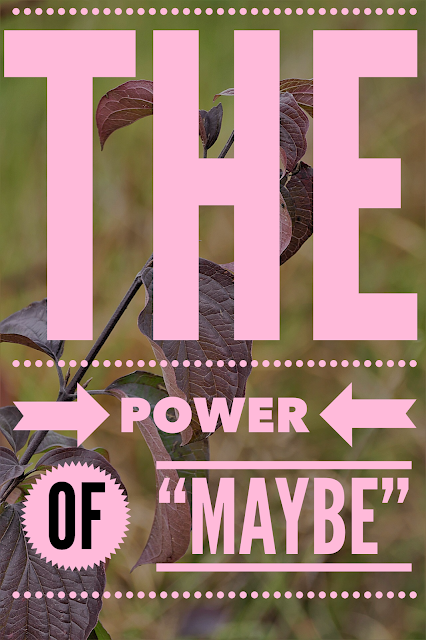Today I want to introduce you to my new favorite word: Maybe.
My family is gearing up for our big move next month, and although we are excited, the whole prospect is also a bit nerve-wracking. Even though we are only moving a few minutes away from our current house, my boys are still feeling all the feels, and I don’t blame them. Transitions can be rough – especially transitions that we don’t see coming.
Change can be scary, for sure. I think the scariest thing for most people is not knowing how things will turn out. When life throws us a curve ball, our thoughts can quickly become riddled with anxiety. What if this is a huge mistake? What if we’re not ok? What if I can’t make this work?”
These thoughts and anxieties are quite common, especially when our lives take an unexpected twist or two. However, although they are normal, they are not always helpful. Dwelling too long on “what if…” is a bad idea.
A while back, I stumbled upon a story entitled “Maybe.” The story begins with an old farmer’s horse running away from his farm. The farmer’s friends feel sorry for him, and comment on what bad luck this is. The farmer simply replies, “maybe.” The next day, the horse returns to the farm, followed by 3 wild horses. The farmer’s friends then say how fortunate he is that he acquired 3 new horses for free. The farmer simply replies, “maybe.” The following day, the farmer’s son tried to ride one of the horses and fell down, breaking his leg. His friends pitied him and said what a misfortune had befallen him. The farmer said (you guessed it), “maybe.” The next day, the army comes through to draft every young man into the military; since the farmer’s son had a broken leg, they didn’t draft him. The farmer’s friends once again congratulated the man and told him how blessed he was. “Maybe,” was the farmer’s only reply.
A couple of things struck me about this story, upon hearing it. First, how does this farmer have so many friends when all he ever says is “maybe?” But once I got over his lack of social skills, I did have to hand it to him…he knew a thing or two about how to deal with life’s curve balls.
Instead of dwelling on “what if,” the farmer learned to say “maybe.” There’s a big difference. “What if…” is the place where anxieties multiply and troubles tend to double. Assuming what we don’t
know, ruminating on the things that
could happen is the opposite of helpful.
It merely steals your potential for joy in the present moment. Also, people don’t usually think things like “what if I win the lottery tomorrow?” Usually, people’s “what ifs” are a Shakespearean-level tragedy, written as non-fiction in their mind.
“Maybe,” on the other hand, is a much wiser thing to say. “Maybe” assumes nothing; it is the essence of
mindfulness and
non-attachment. “Maybe” understands that we have no way of knowing how things will work out. Saying “maybe” helps us hold life with a loose grip and maintain a sense of calm despite life’s ups and downs.
Maybe the tough time you’re going through right now will actually work out for your good. Maybe the transition that is stressing you out will make you a stronger person and prepare you for the next great thing coming your way. Maybe there’s a reason you didn’t get that job, your relationship ended, or you are being forced to relocate. Maybe if you could tell the future, you would actually
be thankful for this stressful circumstance.
We really don’t know what’s coming next, my friends. And that’s ok. Really, it is. The next time you’re going through something difficult, try to steer clear of those pesky “what ifs.” Instead, practice saying “maybe” and
notice how much more peaceful you feel.
Was there ever a time something seemingly “bad” happened to you that actually worked out for your good? How can you apply this idea of “maybe” into your life? Let us know in the comments!
#mc_embed_signup{background:#fff; clear:left; font:14px Helvetica,Arial,sans-serif; width:100%;}
/* Add your own MailChimp form style overrides in your site stylesheet or in this style block.
We recommend moving this block and the preceding CSS link to the HEAD of your HTML file. */
#mc_embed_signup{background:#fff; clear:left; font:14px Helvetica,Arial,sans-serif; width:100%;}
/* Add your own MailChimp form style overrides in your site stylesheet or in this style block.
We recommend moving this block and the preceding CSS link to the HEAD of your HTML file. */
SIgn up for my FREE Reducing Anxiety Email Course:

+ show Comments
- Hide Comments
add a comment